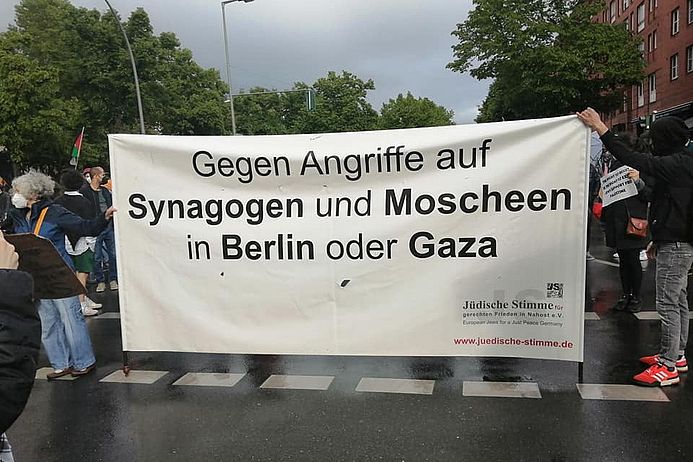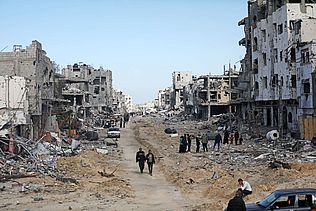Reports of demonstrations in which Jews or Jewish institutions were blamed for actions of the Israeli government when protesters attacked synagogues or chanted antisemitic slogans in various German cities are alarming. However, the blanket description of the protests against the recent escalation in Israel and Palestine as "antisemitic demonstrations" paints a very truncated picture. At least the three demonstrations that a medico colleague and I have attended since 12 May in Berlin not only made completely legitimate demands, in view of the escalating violence, the ongoing closure of Gaza and the continued settlement policy, but these demands were covered by international and human rights law. Above all, however, Palestinians, Jews and Israelis, Germans, people of Arab, Turkish and Kurdish descent protested together, mostly peacefully and without antisemitic or other hate slogans.
However, the media do not focus on this majority opposing the excessive attacks by the Israeli army and demanding human rights for all, in view of their oppression also and especially for Palestinians, of course. The focus is on those groups and individuals who poisoned the overwhelmingly legitimate protests with their chauvinism, (proto-) fascism, antisemitism or with their slogans.
However, it should be noted that there were not only antisemitic statements. At some demonstrations, participants who were recognisable not only as being in solidarity with Palestinians, but also with Kurds, were threatened by Turkish nationalists. It is well known that members of the Turkish fascist Grey Wolves are also present at pro-Palestinian demonstrations. Standing up for Palestinian rights can only be emancipatory if it is understood as part of the struggle for the universalistic character of human rights. Of course, this must also include the Jewish population of Israel – asymmetry or not. This attitude does not first require a settlement of the conflict. As a principle, this alone can be the starting point.
Fight against antisemitism?
In view of the antisemitic incidents, various voices rightly called for a more determined fight against antisemitism. It was partly the same voices that then protested at the Brandenburg Gate at the demonstration of the "Solidarity Alliance Israel" against antisemitism in Germany and spoke out in favour of Israel's right of self-defence, thus taking a completely one-sided position in favour of the Israeli government.
When in the process a top politician like Cem Özdemir (supposedly) quotes Golda Meir as saying, "There will only be peace when the Arabs love their children more than they hate us", he is not only showing solidarity with Israel, but also using racist resentment. Here the Israeli civilian population, which has to take refuge in bunkers and whose army merely defends the country against terrorists, there "the Arabs", who do not love their children enough and who only understand the language of force. Here civilisation and Western values, there barbarism, no human individuals, but only an amorphous mass. It is precisely those who rightly oppose sweeping group-related attributions in their commitment against antisemitism who should be aware of the effects of dehumanising language. It contributes to a lack of empathy towards those affected, in this case Palestinians.
Democratic participation – but the right way
In the daily talk of the TV channel Phoenix, Felix Klein, the Federal Government Commissioner for Jewish Life in Germany and the Fight against Antisemitism, said: "We must invite the communities that are now very agitated in the Muslim spectrum to discuss and not to engage in violence. They must participate in the political discourse, in the democratic discourse. If there is discontent, then they must express it through registered demonstrations, through events, but not through violence, and this is where I see my task."
Now, numerous people have done just that (including Jewish and Israeli ones). Klein reduced their reactions to the violence on the ground to a temporary emotional outburst with "agitation". The oppression and discrimination they opposed, however, are not subjective impressions of an irrational "Muslim spectrum", but objectively verifiable and thoroughly documented violations of law.
The problem with their democratic participation in the discourse seems to be that their view of recent events and the policies of the Israeli government, but above all their expectation of what to do about it, differs substantially from the official German position. The majority of the demonstrators seems to be well aware of the discrepancy between the one-sided partisanship of the German government and the action that is actually required under international and human rights law. These demonstrators are making demands that should be uncontroversial among all those who see these legal norms not only as instruments of enforcing one’s own interest in politics, but as the central foundation of our often invoked common canon of values. Instead, they have been portrayed as antisemitic in toto.
Two narratives – ours and the wrong one
The public debate is also about the view of the history and causes of the conflict. With regard to people with a migration history in their family, Felix Klein said in the same interview: "There must be more education about the founding of the State of Israel, about the special relationship that Germany has with Israel, that, as the Chancellor once said, it is part of the German reason of state that Israel's right to exist must be guaranteed. And perhaps it is also made clear to them that if they follow this, it will make a good impression. That is a sign of willingness to integrate."
What image of history is to be conveyed here in order to prevent antisemitism? The Munich-based association DEIN, which recently doubted the legitimacy of Jordan's existence in an open letter to Annalena Baerbock and referred to the Israeli-occupied West Bank – as the settler movement and the Israeli right also do – as Judea and Samaria, spreads its view of the circumstances of the founding of the state of Israel in its exhibition "1948". This version corresponds much more to the founding myth that is still cultivated by the state in Israel today than to the historical facts that have been established by historians for many years, also with recourse to pre-state Zionist and Israeli sources. If one believes this exhibition, Zionism and the state of Israel bear (almost) no responsibility for the suffering and flight of the Palestinians. It was above all "the Arabs" themselves who were to blame. Felix Klein is the patron of this exhibition. Two other antisemitism commissioners explicitly praised it or are members of the advisory board to the exhibition. There is no room for details and nuances of the factually much more complicated history. Nor for the problems of the present – here and there.
What else can this mean than that in official Germany there is no room for the biographies of people marked as Muslim or migrant whose family stories are connected to the region and especially to Israel and Palestine? It sounds as if they can only acquire any candidature to possibly be considered part of society at some point if they submit to a narrative that contradicts their collective as well as individual experiences.
What is it actually about right now?
When people are confronted with the condition to deny the history of flight and expulsion in their own families, when the acceptance of a single narrative that is marked as correct and is only partly based on historical facts is made the litmus test for the willingness of these people to integrate, this deepens the rifts. It does not contribute to integration – a controversial term in itself – and certainly not to a better understanding between Jews and people with a Muslim background in Germany. One goal should indeed be to fill these gaps with knowledge about the history of anti-Jewish persecution and the Shoah in Europe.
However, in an immigration society like Germany, it would be illusory to believe that a more widespread knowledge of the painful Jewish history in Europe will, as it were, bury or obscure the personal stories. These other stories remain. And the people to whom they belong live here and have long been part of German society – even if they continue to be marked as foreign.
The concern to force those affected under a specifically German narrative becomes false and dangerous at the latest when it is used to sweepingly defame and discriminate against groups and people read as "immigrant". If the acceptance of this narrative is made the litmus test for integration, then this is not about people having or finding their place in German society while respecting their own history, but about hegemony and forced assimilation.
For a long time, people read as migrant or Muslim have not spoken out as loudly and clearly as they have in recent weeks. A debate has begun about what it means to stand up for Palestinian rights as Palestinians in the specific German context. This issue, just like the occupation and settlement policy on the ground, will not vanish into thin air. If peaceful coexistence here in Germany is not to be jeopardised, we need a constructive and, above all, factual approach to the Middle East conflict. Success in the fight against antisemitism, but also against racism, will require more than "making a good impression". A start could be to seek a dialogue at eye level with those about and without whom is debated and on whom judgement is passed so blithely in this country.


